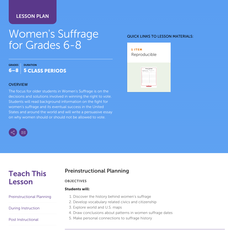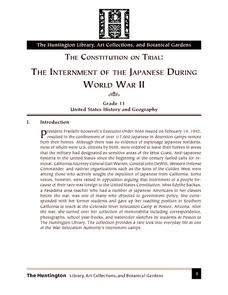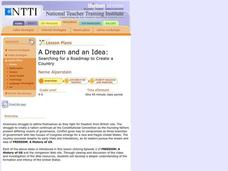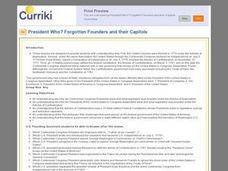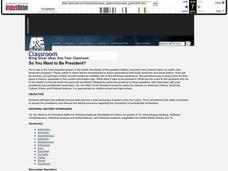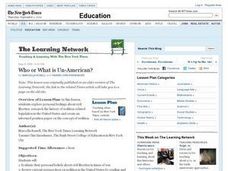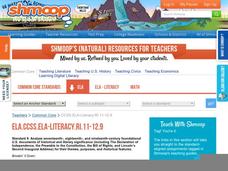Judicial Learning Center
The Appeal Process
Why doesn't the Supreme Court hear testimony from witnesses? How do they complete an entire proceeding in less than two hours? A helpful lesson guides scholars of criminology through these and other questions by explaining how appeals...
C-SPAN
14th Amendment Equal Protection Clause
Two Supreme Court cases, Plessy v. Ferguson and Brown v. Board of Education take center stage in a lesson about the Equal Protection Clause of the 14th Amendment. Class members research both cases to compare and contrast the rulings.
Scholastic
Women's Suffrage for Grades 6–8
Learners study the decisions and solutions involved in winning the right to vote. After reading background information on the fight for women's suffrage, including one woman's story, and its eventual success in the United States and...
Curated OER
The Constitution on Trial: The Internment of the Japanese During World War II
Eleventh graders analyze primary source documents during the Second World War. Students recall statements of Japanese-Americans who were placed into internment camps during the war.
Curated OER
A Dream and an Idea: Searching for a Roadmap to Create a Country
Students compare and contrast opposing visions of government held by the founding fathers. They evaluate the roles of historical leaders in shaping the U.S. as an emerging nation.
Curated OER
The Invasion of Iraq
Students explore the war in Iraq. They use videos, newspapers, and other media to examine the circumstances leading up to the invasion, the war's major battles, and the post-war situation on the ground. Students read letters from Iraq...
Curated OER
A Dictionary of Independence
Young scholars use events and biographies from their state's history and U.S. history, to create a dictionary of terms for citizens of a democracy.
Curated OER
President Who? Forgotten Founders and Their Capitols
Students explore the beginning of the United Colonies that were formed in 1774. In this history lesson, students discuss the Articles of Confederation and then answer questions about the events surrounding the development of the...
Curated OER
Marching For Freedom
Students appreciate the sacrifices that people from across the country made to ensure that all citizens could exercise their constitutional right to vote. They access excellent websites and documents imbedded in this plan to guide their...
Curated OER
Thomas Jefferson on the Sedition Act
Students research and cite arguments Jefferson used in objecting to the Sedition Act. They discuss Jefferson's opinion on how constitutional questions about the Sedition Act could be resolved.
Curated OER
The United States Flag
Students discover the meaning and symbolism behind the American flag. In this lesson on National symbols, students design a flag for their school, explain the symbolism they used, and distinguish the elements that constitute the US Flag....
Curated OER
Learning to Respect Each Other
Discover how important Martin Luther King Jr. is to our society. In this civil rights lesson, investigate how Dr. King was an advocate for nonviolence and how he fought for civil rights for all Americans. Read and analyze Dr. King's "I...
National Endowment for the Humanities
Slavery and the American Founding: The "Inconsistency Not to Be Excused"
High schoolers examine slavery in the revolutionary and colonial eras of the United States. In this slavery lesson, high schoolers investigate the presence of slavery in early America, the language of the Constitution, and the intent of...
Curated OER
Who Represents You?
Students investigate Congress and how individuals are represented in this Country. In this government lesson, students complete worksheets research government web sites to determine which senators and congressmen represent them....
Curated OER
Tribal Sovereignty Mock Trial
Students discuss the issue of tribal/native nation sovereignty. They review the Constitution of the U.S. and discuss how it legally provides for sovereign nations. Then they participate in a mock trial of the 1823 Supreme Court Case...
Curated OER
Working in the World
Tenth graders read a selection of "Behind the Scenes" and other websites. They use a list of characteristics of effective citizens in the U.S. to identify characteristics represented in the work, "Elizabeth Keckley: Mrs. Lincoln's...
Curated OER
So You Want to Be President?
Students view a documentary on U.S. Presidents. Those called to serve be remembered by future generations that study American and world history. After viewing, students discuss what they saw then create a poster about the electoral process.
Curated OER
Who or What is Un-American?
Students explore concepts about civil liberties, research the history of sedition-related legislation in the U.S. and create a position paper on the topic.
Curated OER
State Symbols
Third graders examine the symbolism of the United States by observing different flags. In this U.S. History lesson plan, 3rd graders utilize the Internet to research state seals, flags, and other symbols that represent specific...
NPR
Same-Sex Marriage
The battle over same-sex marriage is a prevalent issue in the United States, and a valuable topic to be discussed in your social studies classroom. Here is a basic outline of introductory questions, focus questions, vocabulary, and media...
Shmoop
ELA.CCSS.ELA-Literacy.RI.11-12.9
Guided by close-reading questions, groups examine the similarities and differences between the Declaration of Independence and the Bill of Rights. In addition, they look at how the principles are presented in these two foundational US...
Curated OER
Religion in the Schools
The requirements of the Equal Access Act are studied and applied to factual situations. By looking at the particular contexts suggested your class can examine the difficulties faced by administrators in whether they should permit...
Curated OER
Bill of Right in Action
Groups reserach and write about topics given to them by their teacher dealing with the Bill of Rights.
Curated OER
Do Suspected Enemies Have Rights?
Students investigate the history of Japanese immigration. They complete an online Webquest, explore various websites, answer discussion questions, and locate and read newspaper articles about enemy compatants.
Other popular searches
- Amendments u.s. Constitution
- U.s. Constitution Test
- U.s. Constitution Day
- U.s. Constitution Article 1
- The u.s. Constitution
- U.s. Constitution and Pdf
- U.s. Constitution Articles
- U.s. Constitution Word Search
- Government u.s. Constitution
- U.s. Constitution and Pd
- U S Constitution Lessons
- U.s Constitution Lessons




